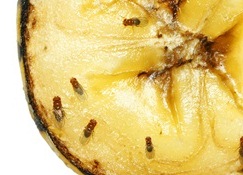RTD Success Stories - Intelligent approaches to achieving pesticide-free produce
"This project – the EU-funded FRUIT FLIES SGGW project – was basically about developing pesticide-free methods for horticultural pest management," explains Professor Slawomir Lux, a world-renowned expert on fruit flies from the Warsaw University of Life Sciences (SGGW). The project, which was completed in 2011, examined the possibility of applying Integrated Pest Management (IPM) to control pests on crops and farms. IPM is seen as a more eco-friendly and intelligent approach to controlling pests than simply using strong pesticides. The professor and his team hope that the results will lead to a more ecological way of producing consumer-safe fresh fruit and vegetables, which would appeal to farmers and consumers alike. evaluating pesticide alternatives "I tried to assess the effective use of insect attractants – odours which attract insects – and pathogens (infectious micro-organisms, such as a virus, bacterium or fungus, which cause disease in insects) as an alternative to pesticides," explains Prof. Lux. The project concept was to apply the attractant and pathogen in the form of an insect trap, which would act as a long-lasting and biodegradable baiting station. Pests can decimate crops and produce. The traditional method of dealing with pests has usually been to apply pesticides. However, growing awareness of the damage certain chemicals can have on both the environment and human health has led to more research being focused on developing effective and safe alternatives. Prof. Lux focused on fruit flies – insects which infest fresh fruits just before harvest. Several baiting station prototypes were evaluated, and a major breakthrough came with the development of software capable of accurately estimating the impact of affected flies on fruit and vegetable production. This software simulated insect behaviour, taking into account seasonal variations. The model was designed to allow ‘virtual’ IPM pre-assessments, to assist IPM implementation, and to support decision-making and training. "The stochastic model – a tool for estimating probable distributions – and software simulating on-farm fruit fly behaviour and their response to IPM actions was finalised, and has already been presented at an international conference in Crete, Greece (July 2012)," says Prof. Lux. "It is now being published." As a result of the project’s success, Prof. Lux is currently in the process of establishing a modern laboratory at the SGGW for insect behaviour and the micro-encapsulation of biologically active compounds. The state-of-the-art technique being pioneered by the researchers could open the door to the application of IPM in other crops. Certainly, consumer demand for ecological, safe produce is only set to increase. Building up expertise The completed project also drew on Prof. Lux’s wealth of experience. It was launched following his return to Europe from Africa, where for 15 years he studied insect behaviour around crops in Kenya. The EU was keen to help him use – and pass on – his knowledge and experiences. "The international reintegration grant I benefited from supports researchers returning to Europe after several or many years of working abroad, looking for resources that are not always easy to find, but that are basic to starting research activities back home," explains Prof. Lux. "The grant allowed me not only to reintegrate with the Warsaw University of Life Sciences and initiate my research there, but also served as a stepping stone for creating my own grant portfolio to sustain my research activities further." Prof. Lux' research continues. He is currently expanding his studies into the micro-encapsulation of biologically active compounds that could assist in IPM. The successful completion of the EU FRUIT FLIES SGGW project is one step on the road to bringing Europe closer to perfecting IPM, and protecting crops and produce in an effective and safe way. - Project name: Stochastic model of on-farm fruit fly behaviour and their response to IPM interventions - Project acronym: FRUIT FLIES SGGW% - FRUIT FLIES SGGW project website(opens in new window) - Project reference number: 208856 - Name/country of project coordinator: Warsaw Agricultural University, Poland - Total project cost: EUR 100 000 - EC contribution: EUR 100 000 - Project start/end: October 2007 to September 2011



